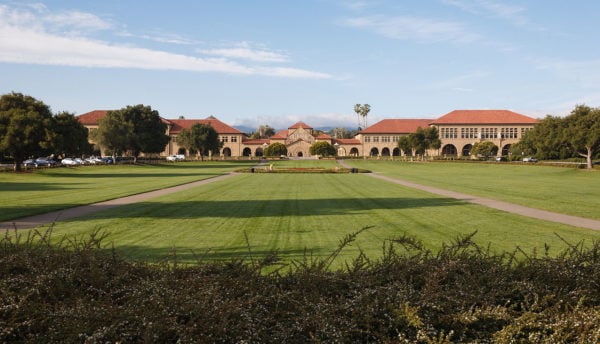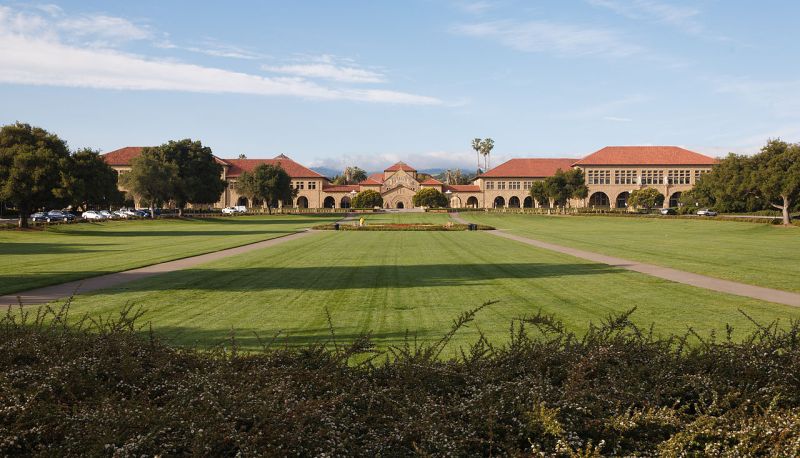
The Earth Systems department recently celebrated its 25th birthday, with a fun and “Farm casual” gathering on the O’Donahue Family Stanford Educational Farm. Students, prospective majors, alumni, faculty and friends gathered and raised glasses of wine and hors d’oeuvres on compostable sticks to 25 years of Earth systems excellence.
Folks gathered in the newly opened barn to hear from a panel of Earth Systems alumni on where their paths and their degrees have taken them. The panel was moderated by Pam Matson, former dean of the School of Earth, Energy, & Environmental Sciences and former director of Earth systems.
The panelists all shared information and anecdotes about their current work, mused about some of the environmental challenges facing us as a global community, and offered advice to the current Earth Systems students in the crowd. Speakers included: Danny Cullenward (BS ‘06 and MS ‘07, who now works at Near Zero), Bill Faries (BS ‘05, MS ‘97, who now works at Bloomberg News), Jenny McColloch (BS ‘04, MS ‘05, who now works in Global Sustainability at McDonald’s), and Jenny Rempel (BS ‘12, who now works at Community Water Center).
In her introduction, Pam Matson (who officially passed on the Dean’s position to Professor Stephan Graham only a day prior to the celebration) noted that the Earth Systems department hasn’t seen that many new directors – “The turnover has been slow, for 25 years.” Earth Systems definitely brings a lot of dedication to the table. In the field of environmental science, the focus generally is on long-term, sustainable work and solutions – perhaps this feeds into the mentality of faculty into the department. Whatever the underlying cause, folks definitely seem to connect with the Earth Systems department on many levels.
Although the director position has seen relatively few changes of hands, Matson added: “I don’t want to give the impression that Earth Systems hasn’t changed.” In 25 years the department has grown and adapted quite a bit, which is part of the essence of the program. Just like the science and the systems studied, the Earth Systems program is a continuous learning and growing experience.
Current students and faculty had a chance to hear about the post-Stanford learning and growth experiences of four Earth Systems alumni. Jenny McColloch went from working at a small Seattle nonprofit to pursuing an MBA, and then ultimately landing in a position at one of the biggest food companies in the world. McDonald’s certainly is an interesting place to be doing sustainability work – the company has enormous reach, and somewhat of a bad rap for health and sustainability. However, this does make it a prime target for effecting change in the fast food landscape.
Many such changes are already taking place, as McColloch related. According to McColloch, the McDonald’s Global Sustainability team is constantly thinking: “How can we use our scale and our brand to push progress in the industry?” They are working on greater intentionality with their sourcing as well as building closer partnerships with food growers and sustainability certifiers, like the Marine Stewardship Council (MSC). McColloch told the group: “Anywhere you go in the world, your filet-o-fish is MSC certified fish.”
In fact, for a company like McDonald’s, sustainability is a form of risk management. It only makes sense for a restaurant company to be invested in promoting a sustainable food system, since they want to be able to continue selling food products for years to come.
Bill Faries (from the class of ‘95, evidently the first “real” class of Earth systems) also spoke to risk management. Faries now writes for Bloomberg News, specifically on National Security and U.S. Foreign Policy. Discussing whether or not the Pentagon has a plan for climate crisis, Faries stated: “There’s a plan for everything. There’s a plan for occupying Canada, if need be,” to which the group responded with hearty chuckles. Jokes aside, it is important that we recognize the security threat posed by climate change and its sometimes unpredictable manifestations.
Faries spoke to the up close and personal realizations that come from seeing climate change in one’s own community. In reference to recent climate crises – the California wildfires, hurricanes in the southern United States and Puerto Rico – Faries said: “That has entered people’s consciousness in a way that maybe it hadn’t before this year.” More so than any form of advocacy or communication, lived experiences seem to push people to a firm conviction on the imminent and urgent threat of climate change and the need for action.
Jenny Rempel added that, unfortunately, the people who endure the brunt of climate crisis are often overlooked by governments. “So often the people who are directly impacted by climate change do not have access to the decision-making tables,” Rempel stated.
Rempel now works at Community Water Center, an organization in San Joaquin Valley that strives to improve access to safe, clean, and affordable water in communities across California. Rempel spoke to the necessity of engaging with frontline communities and making sure that the people most affected by climate change have a leadership role in addressing it.
Near Zero, the workplace of Earth systems alum Danny Cullenward, takes a less grassroots approach, focusing on policy and large-scale solutions to “quickly cut greenhouse gas emissions to near zero.” The team performs research and analysis on energy policy – California’s specifically – as well as technological developments aimed at cutting emissions. Although this career path has a more global focus, Cullenward’s advice to current students was personal: “Listen to and talk to people you disagree with.”
Bill Faries advised current students to “be open to opportunities that don’t fall into your timetable.” As a journalist, Faries preached a willingness to jump for opportunities, even ones that may seem inconvenient or disruptive to current life plans.
Jenny McColloch and Jenny Rempel’s advice focused on personal well-being as essential for sustainability work. McColloch advised “leaning on your network,” and self care, to which Rempel added: “Self-care is key. Do your work in community. Think about which communities you are accountable to.”
Following the panel, Matson invited everybody to carry on and “party” – the sun began to set over the farm; wine, strawberry lemonade, and hors d’oeuvres flowed and folks enjoyed conversations with their peers, mentors, and mentees. Certainly, Earth systems is one community that fosters collective power. Whether it’s the self-care that takes place in the homey Earth systems office, the opportunities generated through classes and connections, or the continual dialogue between members of a dynamic community, this now 25-year-old department is doing plenty of things right.
Contact Claire Thompson at clairet ‘at’ stanford.edu.
